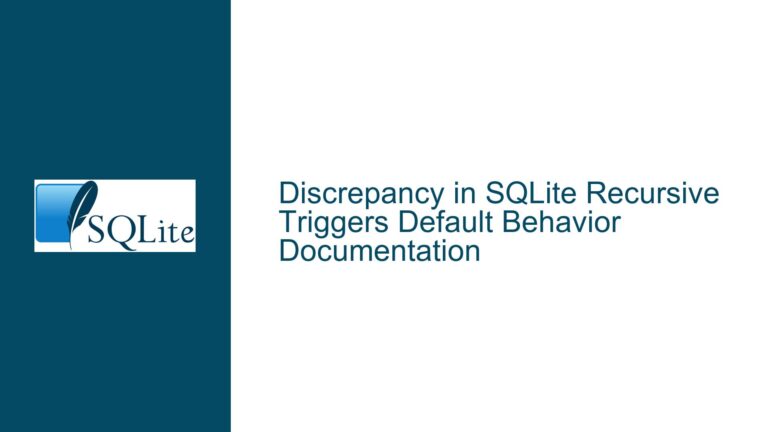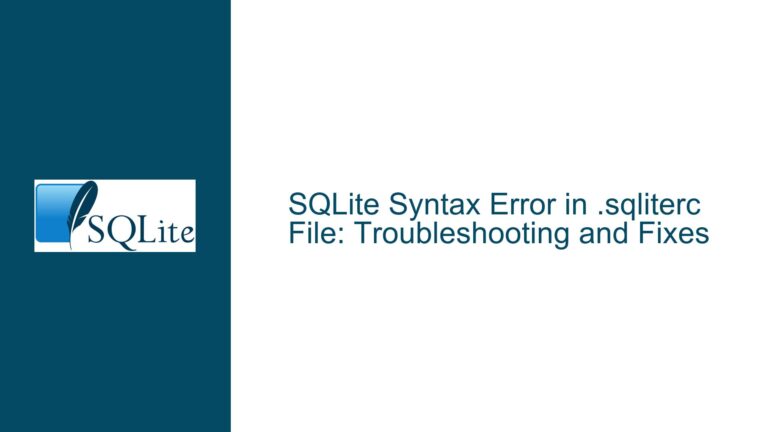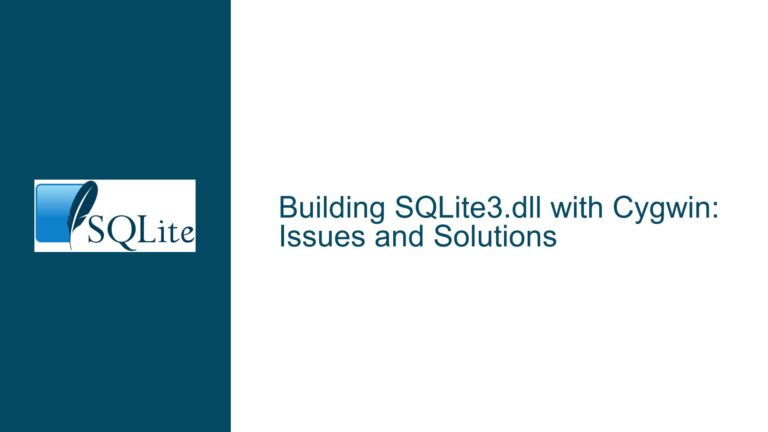SQLite CLI Pipe Deserialization Failure: Causes and Solutions
Issue Overview: Silent Failure in .open --deserialize and .backup --async with Pipes
The core issue revolves around the SQLite CLI’s inability to handle deserialization and asynchronous backup operations when the input is provided via a pipe. Specifically, the .open --deserialize and .backup --async commands fail silently when attempting to read from a pipe, such as /proc/self/fd/4. This behavior is problematic because it does not provide any feedback to the user, making it difficult to diagnose and resolve the issue.
The failure occurs because the underlying C standard library function fseek() is used to determine the size of the input data for memory allocation. However, fseek() is incompatible with pipes, as they are inherently non-seekable streams. Pipes do not support random access, and their size cannot be determined in advance, which is a requirement for the current implementation of deserialization and backup operations in SQLite.
The silent failure is particularly frustrating because it leaves users unaware of the root cause. The expectation is that SQLite should either handle pipes gracefully or, at the very least, provide an explicit error message when an operation is attempted on an unsupported input type.
Possible Causes: Why Pipes Fail with Deserialization and Backup Operations
The primary cause of the failure lies in the way SQLite handles input data for deserialization and backup operations. When .open --deserialize or .backup --async is invoked, SQLite attempts to determine the size of the input data to allocate the necessary memory. This is done using the fseek() function, which is designed for seekable files, not pipes.
Pipes are unidirectional data streams that do not support random access. They are typically used for inter-process communication, where data is written to one end and read from the other. Since the size of the data in a pipe is not known in advance, fseek() cannot be used to determine it. This limitation causes the operation to fail silently, as SQLite does not have a fallback mechanism for handling non-seekable inputs.
Another contributing factor is the lack of error handling for unsupported input types. SQLite assumes that the input provided to .open --deserialize and .backup --async is a seekable file. When this assumption is violated, the failure is not communicated to the user, leading to confusion and frustration.
Additionally, the asynchronous nature of .backup --async complicates matters further. Asynchronous operations require careful handling of input and output streams to ensure data integrity. When a pipe is used as the input source, the lack of seekability and unknown size make it difficult to guarantee that the backup operation will complete successfully.
Troubleshooting Steps, Solutions & Fixes: Handling Pipes in SQLite CLI Operations
To address the issue of silent failures when using pipes with .open --deserialize and .backup --async, several approaches can be taken. These include modifying SQLite’s behavior to handle non-seekable inputs, providing explicit error messages, and implementing alternative methods for determining input size.
1. Modify SQLite to Handle Non-Seekable Inputs
One potential solution is to modify SQLite’s deserialization and backup logic to handle non-seekable inputs like pipes. This could involve reading the input data in chunks and dynamically allocating memory as needed, rather than relying on fseek() to determine the size upfront.
For deserialization, SQLite could read the first few bytes of the input to extract the database header, which contains information about the page size and the total number of pages. Using this information, SQLite could allocate the necessary memory and read the remaining data from the pipe. If the pipe does not provide enough data, the operation would fail with an appropriate error message.
For asynchronous backups, SQLite could implement a streaming approach, where data is read from the pipe and written to the backup file in real-time. This would eliminate the need to determine the input size in advance and allow the operation to proceed even with non-seekable inputs.
2. Provide Explicit Error Messages
Another important step is to improve error handling in SQLite to provide explicit feedback when an operation is attempted on an unsupported input type. Instead of failing silently, SQLite should detect when fseek() is called on a non-seekable stream and return an error message indicating that the input type is not supported.
This would help users quickly identify the root cause of the issue and take appropriate action, such as using a seekable file instead of a pipe or implementing one of the alternative solutions described below.
3. Implement Alternative Methods for Determining Input Size
If modifying SQLite’s behavior to handle non-seekable inputs is not feasible, an alternative approach is to implement a mechanism for determining the size of the input data without relying on fseek(). This could involve using external tools or scripts to preprocess the input and provide the necessary information to SQLite.
For example, a script could be written to read the entire contents of the pipe into a temporary file, determine its size, and then pass the file to SQLite for deserialization or backup. While this approach adds an extra step to the process, it ensures that SQLite receives a seekable input and can perform the operation successfully.
4. Use Extensions or Custom Functions
Another option is to create an SQLite extension or custom function that handles the deserialization or backup of data from pipes. This extension could implement the necessary logic to read the input data in chunks, allocate memory dynamically, and perform the operation without relying on fseek().
The extension could be written in C or another language supported by SQLite’s extension mechanism, and it could be distributed as a precompiled binary or source code for users to compile and install. This approach provides a flexible and customizable solution for handling non-seekable inputs, while also allowing users to extend SQLite’s functionality to meet their specific needs.
5. Workarounds for Existing Limitations
In cases where modifying SQLite or implementing an extension is not possible, users can employ workarounds to achieve the desired functionality. One such workaround is to use a temporary file to store the data from the pipe before passing it to SQLite.
For example, the following command sequence could be used to deserialize data from a pipe:
command-generating-SQLite > temp.db
sqlite3 --deserialize temp.db
Similarly, for asynchronous backups, the data could be written to a temporary file and then passed to SQLite:
command-generating-SQLite > temp.db
sqlite3 ".backup --async temp.db backup.db"
While this approach requires additional disk space and I/O operations, it provides a reliable way to work around the limitations of pipes and ensure that SQLite can perform the desired operations.
Conclusion
The silent failure of .open --deserialize and .backup --async when used with pipes is a significant limitation in SQLite’s CLI. The root cause lies in the use of fseek() to determine the size of the input data, which is incompatible with non-seekable streams like pipes. To address this issue, SQLite could be modified to handle non-seekable inputs, provide explicit error messages, or implement alternative methods for determining input size. Additionally, users can employ workarounds such as using temporary files or creating custom extensions to achieve the desired functionality.
By understanding the underlying causes and exploring potential solutions, users can overcome the limitations of pipes and leverage SQLite’s powerful features for deserialization and backup operations. Whether through modifications to SQLite itself, the use of extensions, or practical workarounds, there are multiple paths to resolving this issue and ensuring a smooth and reliable experience with SQLite.






